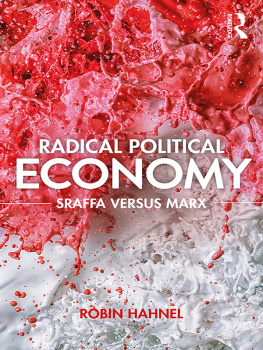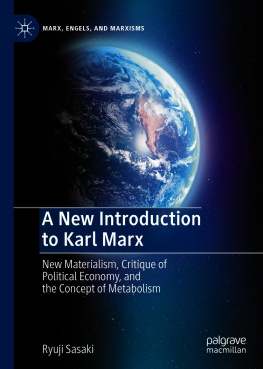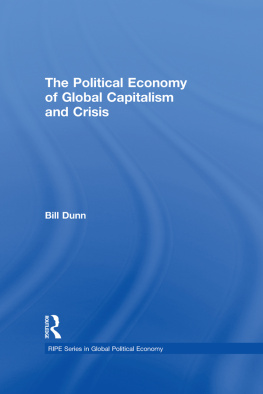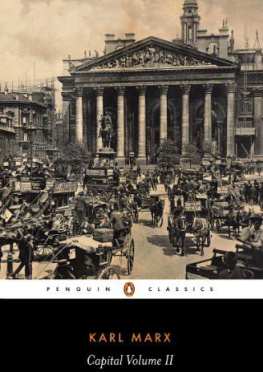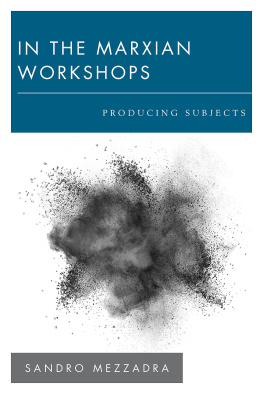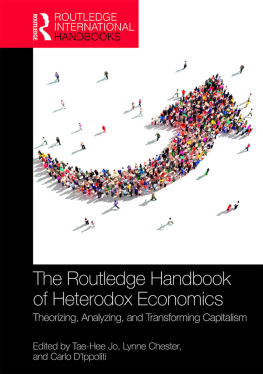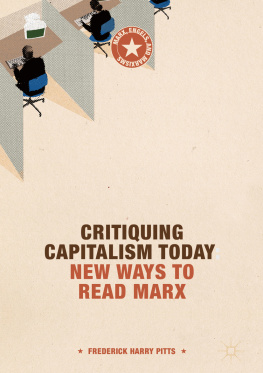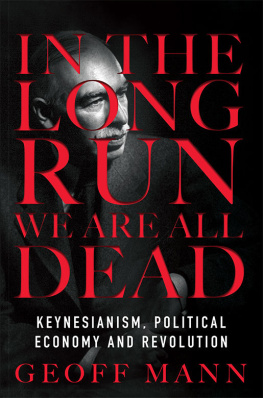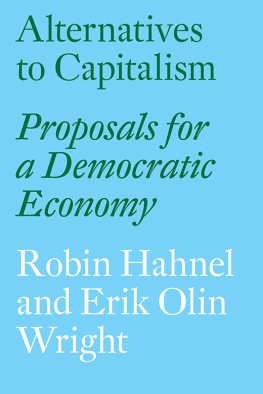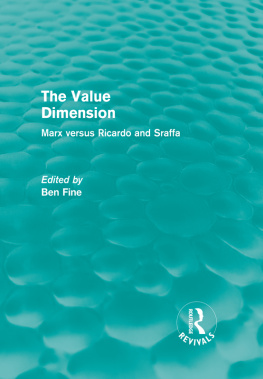RADICAL POLITICAL ECONOMY
For too long radical political economy has suffered for lack of a coherent alternative to formal Marxian economic theory. People have had to choose between (1) continuing to use a formal model based on the labor theory of value as Marx developed in Capital to justify and retain ones opposition to capitalism, or (2) abandoning the formal Marxian framework as outdated, and risk losing a critical evaluation of capitalism. Radical Political Economy: Sraffa Versus Marx provides readers with a third choice.
A point-by-point comparison of Sraffian and Marxian treatments of prices, profits, technological change, economic crises, environmental sustainability, and the moral case against capitalism, are presented in six core chapters. They explain how the Sraffian treatment surpasses the formal Marxian treatment in every case. Both Marxian and Sraffian theories are presented in a highly accessible way, while large professional literatures are thoroughly referenced throughout.
Marx was not the first, but remains the greatest, critic of capitalism, and richly deserves his place in history. However it is time to use intellectual tools unavailable to Marx in the nineteenth century to improve upon his formal analysis. This book is of great importance to those who study Sraffa and Marx, as well as academics and students who are interested in political economy, the history of economic thought, and economic and philosophical theory.
Robin Hahnel is Professor Emeritus at the Department of Economics, American University Washington DC, USA. He is also the Co-Director of Economics for Equity and the Environment and has published widely in the fields of radical political economy and environmental economics.
First published 2017
by Routledge
2 Park Square, Milton Park, Abingdon, Oxon OX14 4RN
and by Routledge
711 Third Avenue, New York, NY 10017
Routledge is an imprint of the Taylor & Francis Group, an informa business
2017 Robin Hahnel
The right of Robin Hahnel to be identified as author of this work has been asserted by him in accordance with sections 77 and 78 of the Copyright, Designs and Patents Act 1988.
All rights reserved. No part of this book may be reprinted or reproduced or utilised in any form or by any electronic, mechanical, or other means, now known or hereafter invented, including photocopying and recording, or in any information storage or retrieval system, without permission in writing from the publishers.
Trademark notice: Product or corporate names may be trademarks or registered trademarks, and are used only for identification and explanation without intent to infringe.
British Library Cataloguing in Publication Data
A catalogue record for this book is available from the British Library
Library of Congress Cataloging in Publication Data
Names: Hahnel, Robin, author.
Title: Radical political economy : Sraffa Versus Marx / Robin Hahnel.
Description: 1 Edition. | New York, NY : Routledge, 2017. | Includes bibliographical references and index.
Identifiers: LCCN 2017001421| ISBN 9781138050020 (hardback) | ISBN 9781138050037 (pbk.) | ISBN 9781315169149 (ebook)
Subjects: LCSH: Economics. | Technological innovations--Economic aspects. | Capitalism--Moral and ethical aspects. | Marx, Karl, 1818-1883--Political and social views. | Sraffa, Piero--Political and social views.
Classification: LCC HB171 .H2354 2017 | DDC 330.15/3--dc23
LC record available at https://lccn.loc.gov/2017001421
ISBN: 978-1-138-05002-0 (hbk)
ISBN: 978-1-138-05003-7 (pbk)
ISBN: 978-1-315-16914-9 (ebk)
Marx deserves his place in history as the greatest critic of capitalism. Marx opened our eyes to how the economic sphere of social life exerts a powerful influence over the political, cultural, and reproductive spheres of social life. Marx gave intellectual support to workers instinct that capitalism systematically exploits them. And Marx reminded us that life beyond capitalism, where workers manage and coordinate their economic activities themselves, democratically, fairly, and efficiently, is a real possibility.
However a great deal has happened since Marx died in 1883. There are 133 years of world history some of which, such as the Soviet perversion of the socialist vision, and capitalisms recovery from the Great Depression, would have come as a great surprise to Marx. And there have been new intellectual discoveries as well, some of which, such as proof of the FrobeniusPerron theorem in mathematics, and modern, egalitarian, philosophical theories of distributive justice, provide us with intellectual tools unavailable to Marx.
It is time to acknowledge that Marxs early attempt to fashion a formal economic theory of price and income determination in capitalism based on a labor theory of value, and elaborate a Hegelian critique of capitalism can now be surpassed. Not surpassed by neoclassical theory, which only disguises the origins of profits and their lack of moral legitimacy. Surpassed instead by a modern reworking of classical economics along the lines pioneered by Piero Sraffa (1960), centered on the production and distribution of the physical economic surplus, and by a modern egalitarian philosophical theory of distributive justice.
This book argues that Sraffian theory can now provide a stronger basis for radical political economy in the twenty-first century than formal Marxian economic theory for a number of reasons:
Sraffian theory is devoid of embarrassing inconsistencies which plague Marxian formal theory which apologists for capitalism exploit.
Because it uses familiar economic and philosophical concepts rather than a conceptual apparatus abandoned long ago by all except Marxists Sraffian theory is more intelligible to economists, philosophers, and lay audiences today.
Sraffian theory and the Fundamental Sraffian Theorem show more clearly why capitalists are parasites living off the work of others than does Marxian theory and the Fundamental Marxist Theorem.
Formal Marxian economic theory misleads us to search for non-existent crises which distracts us from focusing attention on actual sources of crisis in capitalism.
Finally, no theory unsuited to analyzing the increasingly problematic relation between human economic activity and the natural environment will attract allegiance as the twenty-first century unfolds. Unlike the Marxian labor theory of value which is ill-suited to incorporating inputs from nature into our formal analysis, the Sraffian framework easily accommodates natural resources and rents into an explanation of price and income distribution. Moreover, recent developments demonstrate how Sraffian theory can facilitate a rigorous analysis of what ecological economists call environmental throughput, allow us to formulate sufficient conditions for achieving environmental sustainability in a multi-good economy, and sort out the sense from the nonsense in the steady-state and de-growth literatures.
This book examines six topics: In each topic area both the Marxian and Sraffian treatments are presented and compared. Those six core chapters are preceded by an introduction that pays full homage to Marx, but argues that it is time to improve on his formal modeling, and followed by a conclusion summarizing the advantages of a radical version of modern Sraffian theory.
Since this book is intended for a broad audience, I will use a simple, two sector version of both the Marxian and Sraffian models which requires nothing more than simple algebra, and I will emphasize intuitive explanations for all important results, referring readers to endnotes for more complicated calculations and suitable sources for proofs of key theorems.

